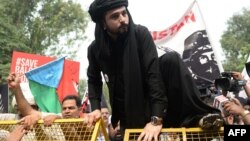With tensions between India and Pakistan running high after an attack on an Indian air base, New Delhi is taking rhetorical aim at Pakistan's troubles in the restive province of Balochistan.
India in recent weeks has focused attention one of Pakistan's most intractable problems - the separatists roiling in the southern province and Islamabad's questionable record on human rights in the region.
"This is a country [Pakistan], which has systematically abused and violated the human rights of its own citizens, including in Balochistan," India's ambassador to the United Nations, Ajit Kumar, said recently.
Balochistan has been hard-hit by militancy and a military backlash against a separatist movement. Hundreds of thousands have been displaced by Pakistani army operations. Human rights groups say thousands of people have been rounded up by the security agencies with no word of their whereabouts. (Report)
Indian Prime Minister Narendra Modi helped trigger the chorus of criticism during an address on India's Independence Day in August, saying people in Balochistan "have thanked me, have expressed gratitude, and expressed good wishes for me."
The remarks drew a swift rebuke from Islamabad.
"He crossed the red line by talking about Balochistan," said Nafees Zakaria, a spokesman for Pakistan's foreign office.Zakaria went on to accuse India of being involved in subversive activities in Balochistan.
While Baluch leaders and activists supporting separatism welcomed India's comments, the amped up verbal war has prompted some Pashtun tribal leaders to threaten attacks against India.
"We get very angry when we watch on television that a Hindi man [Modi] wants to attack us," Malak Jalal Khan Wazir, a tribal leader, told VOA's Deewa service at a tribal chiefs gathering in northwest Pakistan. The meeting was called to show support for the Pakistani army in the face of the recent Indian threats.
"When the army allows us, our 10 million tribesmen, God willing, will fight shoulder-to-shoulder with the army at the border," he said. "We will be even ahead of the soldiers."
Many in the region – and elsewhere in Pakistan – see the threats from some in Pashtun areas against India as hollow.
"We are not in a position to go to war against anyone," Manzoor Ahmad, a youth leader, told VOA at a recent rally held by tribal youth to condemn the tribal chiefs' bellicose, anti-India rhetoric. "We do not want to fight for others.
"We have suffered a lot, our houses and schools have been destroyed, and we have been humiliated in our own country," Ahmad added, referring to the millions of Pashtuns displaced by militancy and the ongoing Pakistani army operations in the region.
In threatening India, some alienated Pashtuns are expressing frustrations over decades of militancy, widespread unemployment, poverty, and poor education in the province, Pashtun leaders say.
"[The] majority of Pashtuns want peace in the region and have raised a strong voice against the threat of war with India," Pashtun politician Bushra Gohar said in an interview with VOA. "They have suffered death, devastation and displacement because of decades of war, violence and extremism and want an end to the madness."
Rather than engaging India, some Pashtun leaders and activists have criticized those calling the India's head should put their energy towards making life better and peaceful at home.
"They [tribal chiefs] should rather focus on the many issues their people are faced with, including their unequal treatment as citizens of the country," said Osman Kakar, a Pashtun politician who represents Balochistan in the senate.




